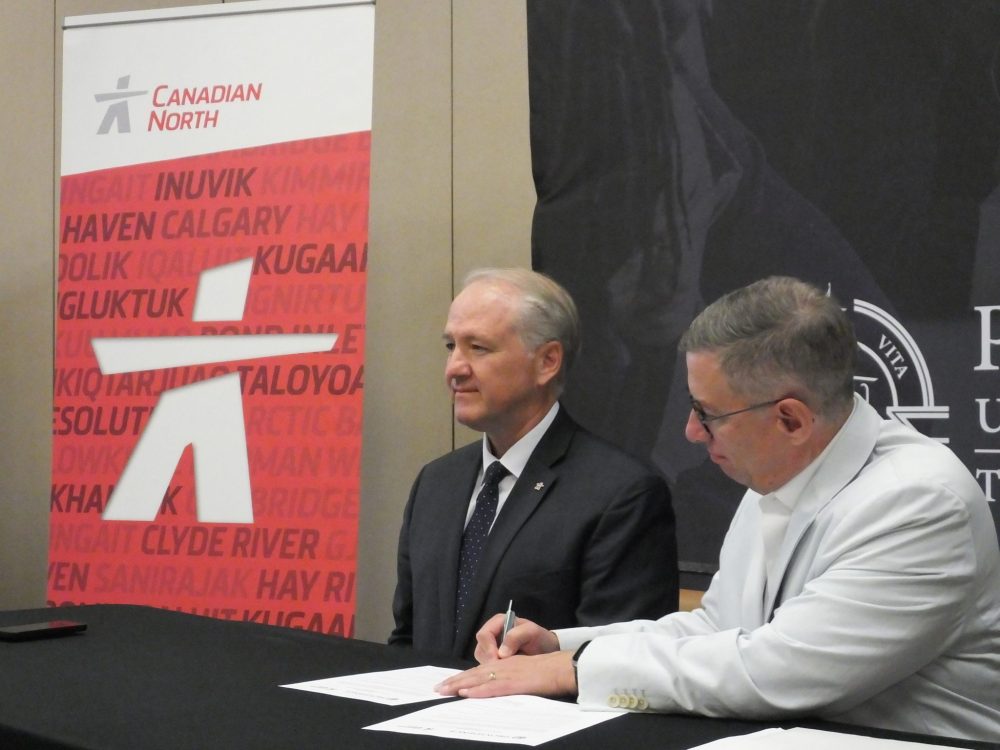Providence elevates training for Inuit pilots
Advertisement
Hey there, time traveller!
This article was published 21/06/2023 (687 days ago), so information in it may no longer be current.
Flying is the only way to get to many communities dotting Canada’s far north. A new initiative between Providence University College and Canadian North Airlines aims to have the Inuit people who live in these communities be the ones to pilot those vital connections.
“We are the lifeline to a lot of these communities. And without the service of Canadian North, the communities would be in peril. So we need a lot of really good, qualified pilots to fly our planes,” said Canadian North president and CEO Michael Rodyniuk.
And training more pilots is desperately needed not just for the North, but for the country and around the world with a pilot shortage getting worse with huge retirement numbers up against high demand. The Canadian Council for Aviation and Aerospace puts the shortage at 8,000 in Canada and 27,000 in the U.S. alone.

Providence hopes to expand its aviation program with Harv’s Air out of Steinbach and St. Andrews by over 200 pilots by 2026, with the first Inuit pilots landing this fall.
They would be coming from as far north as Ellesmere Island in the Arctic Ocean to not only get flying certification, but also a three or four-year Bachelor of Arts or Sciences degree in aviation and business administration if they choose.
Some unique training will be required for flying in the North.
“You can imagine when you’re getting close to the north pole your magnetic compass doesn’t work anymore; it will point in just about any direction,” explained Rodyniuk.
That means learning to find true north. The northern lights playing havoc with radio equipment is another challenge on top of the world.
“We’ll be working with Providence to make sure that’s part of the curriculum so that we have ready pilots, as soon as they graduate they take their cap and gown off and they put on their flight suit, they come up and they start flying with us,” said Rodyniuk.
And with emergency and “upset” training from Harv’s Air, they should be prepared for anything. Upset training may be better known as aerobatic flying.
“That is something we’re known for. Most pilots you fly barely nose up, barely nose down, barely bank. But there’s obviously lots more to the sky. So we like that type of flying because A: it’s kind of fun, truth be told; but it is a good skill-building exercise. If somebody can fly well in all three dimensions, they’re an excellent pilot,” said Harv’s Air owner Adam Penner.
“It’s a rollercoaster you build as you fly,” he added.
Harv’s Air has about 150 commercial pilots training per year now, but Penner hopes to add 100 more within a year thanks to this initiative.
Where all those pilot students are going to live is something still to be worked out.
“We have capacity on campus to house probably the first year or two worth of students. We are also developing capacity in the city,” said Providence president Dr. Kent Anderson.
There will also be a dedicated joint team from Providence and Canadian North helping students making the transition from small, remote communities to southern Canada.
Shelley De Caria, associate vice president of sales and community investment for Canadian North, is an Inuk mother who hopes her son is in the first graduating class, But she experienced the culture shock herself when she flew down to Montreal for school.
“A lot of the times students will want to go home, even for just a weekend,” said De Caria.
Seats on flights out of Winnipeg back to north will be made available for visits, said Rodyniuk.
There can also be a language barrier as not all Inuit students will be fluent in English. Providence can help with proficiency programs. But it is also a chance for the Inuit students to share their culture with students from the region, said Rodyniuk.
That culture does not usually include Christianity. Anderson did say as a faith-based college, Providence does not hide the religious perspective.
“There is a perspective that Providence is a Bible school. It’s not, it’s a university and we trust that the government appreciates that we’re actually a university,” said professor of communications and media Nicholas Greco.
He added that all students do take theologically-based courses.
“That’s only a small part of their general requirements.”
“We believe post-secondary education is really a right for people, and so we hope we can impart knowledge to them but of course in the frameworks that we have,” said Greco.
With knowledge comes opportunity.
“As an Inuk and a senior executive with Canadian North, I know that my people are capable of great things. I know for far too long we have been underestimated and overlooked. Many of us are reluctant to take that first step. We believe at Canadian North all you need is a chance. We have the wings, we just need to fly,” said De Caria.
